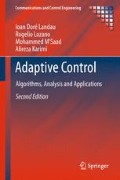Abstract
This chapter addresses the problem of attenuation (rejection) of unknown disturbances without measuring them by using a feedback approach. In this context, the disturbance model is unknown and time varying while the model of the plant is known (obtained by system identification) and almost invariant. This requires an adaptive approach. The term “adaptive regulation” has been coined to characterize this control paradigm. Direct and indirect adaptive regulation strategies using the internal model principle and the Youla-Kucera parameterization will be presented. The evaluation of the methodology is done in real time on an active vibration control system using an inertial actuator.
Access this chapter
Tax calculation will be finalised at checkout
Purchases are for personal use only
Notes
- 1.
Throughout this chapter it is assumed that the order of the disturbance model is known but the parameters of the model are unknown (the order can be estimated from data if necessary).
- 2.
The complex variable z −1 will be used for characterizing the system’s behavior in the frequency domain and the delay operator q −1 will be used for describing the system’s behavior in the time domain.
- 3.
The “only if” does not apply if D p divides A.
- 4.
Of course it is assumed that D p and B do not have common factors.
- 5.
- 6.
The magnitude of the adaptation gain gives an indication upon the variance of the parameter estimation error—see Chap. 3.
- 7.
The convergence towards zero of ε 0(t) can be proven also with the “bounded growth” lemma of Goodwin and Sin (Chap. 11, Lemma 11.1).
- 8.
These experiments have been carried out by M. Alma (GIPSA-LAB).
References
Amara FB, Kabamba PT, Ulsoy AG (1999a) Adaptive sinusoidal disturbance rejection in linear discrete-time systems—Part I: Theory. J Dyn Syst Meas Control 121:648–654
Amara FB, Kabamba PT, Ulsoy AG (1999b) Adaptive sinusoidal disturbance rejection in linear discrete-time systems—Part II: Experiments. J Dyn Syst Meas Control 121:655–659
Anderson BDO (1998) From Youla-Kucera to identification, adaptive and nonlinear control. Automatica 34:1485–1506
Åström KJ, Wittenmark B (1995) Adaptive control, 2nd edn. Addison Wesley, Boston
Bengtsson G (1977) Output regulation and internal models—a frequency domain approach. Automatica 13:333–345
Bodson M (2005) Rejection of periodic disturbances of unknown and time-varying frequency. Int J Adapt Control Signal Process 19:67–88
Bodson M, Douglas SC (1997) Adaptive algorithms for the rejection of sinusoidal disturbances with unknown frequency. Automatica 33:2213–2221
Constantinescu A (2001) Commande robuste et adaptative d’une suspension active. Thèse de doctorat, Institut National Polytechnique de Grenoble
Constantinescu A, Landau ID (2003) Direct controller order reduction by identification in closed loop applied to a benchmark problem. Eur J Control 9(1)
Ding Z (2003) Global stabilization and disturbance suppression of a class of nonlinear systems with uncertain internal model. Automatica 39:471–479
Ficocelli M, Amara FB (2009) Adaptive regulation of MIMO linear systems against unknown sinusoidal exogenous inputs. Int J Adapt Control Signal Process 23(6):581–603
Francis BA, Wonham WM (1976) The internal model principle of control theory. Automatica 12:457–465
Gouraud T, Gugliemi M, Auger F (1997) Design of robust and frequency adaptive controllers for harmonic disturbance rejection in a single-phase power network. In: Proc of the European control conference, Bruxelles
Hillerstrom G, Sternby J (1994) Rejection of periodic disturbances with unknown period—a frequency domain approach. In: Proc of American control conference, Baltimore, pp 1626–1631
Ioannou PA, Sun J (1996) Robust adaptive control. Prentice Hall, Englewood Cliffs
Johnson CD (1976) Theory of disturbance-accomodating controllers. In: Leondes CT (ed) Control and dynamical systems, vol 12, pp 387–489
Karimi A (2002) Design and optimization of restricted complexity controllers—benchmark. http://lawww.epfl.ch/page11534.html
Landau ID, Zito G (2005) Digital control systems—design, identification and implementation. Springer, London
Landau ID, M’Sirdi N, M’Saad M (1986) Techniques de modélisation récursive pour l’analyse spectrale paramétrique adaptative. Rev Trait Signal 3:183–204
Landau ID, Constantinescu A, Loubat P, Rey D, Franco A (2001a) A methodology for the design of feedback active vibration control systems. In: Proc European control conference 2001, Porto, Portugal
Landau ID, Karimi A, Constantinescu A (2001b) Direct controller order reduction by identification in closed loop. Automatica 37(11):1689–1702
Landau ID, Constantinescu A, Rey D (2005) Adaptive narrow band disturbance rejection applied to an active suspension—an internal model principle approach. Automatica 41(4):563–574
Landau ID, Alma M, Martinez JJ, Buche G (2010, to appear) Adaptive suppression of multiple time varying unknown vibrations using an inertial actuator. IEEE Trans Control Syst Technol
Landau ID, Alma M, Martinez JJ, Buche G (2011) Adaptive suppression of multiple time-varying unknown vibrations using an inertial actuator. IEEE Trans Control Syst Technol doi:10.1109/TCST.2010.2091641
Ljung L (1999) System identification: theory for the user, 2nd edn. Prentice-Hall, Englewood Cliffs
Marino R, Santosuosso GL, Tomei P (2003) Robust adaptive compensation of biased sinusoidal disturbances with unknown frequency. Automatica 39:1755–1761
S Fekri MA, Pasqual A (2006) Issues, progress and new results in robust adaptive control. Int J Adapt Control Signal Process, 519–579
Serrani A (2006) Rejection of harmonic disturbances at the controller input via hybrid adaptive external models. Automatica 42:1977–1985
Tsypkin YZ (1997) Stochastic discrete systems with internal models. J Autom Inf Sci 29(4–5):156–161
Valentinotti S (2001) Adaptive rejection of unstable disturbances: application to a fed-batch fermentation. Thèse de doctorat, École Polytechnique Fédérale de Lausanne
Author information
Authors and Affiliations
Corresponding author
Rights and permissions
Copyright information
© 2011 Springer-Verlag London Limited
About this chapter
Cite this chapter
Landau, I.D., Lozano, R., M’Saad, M., Karimi, A. (2011). Adaptive Regulation—Rejection of Unknown Disturbances. In: Adaptive Control. Communications and Control Engineering. Springer, London. https://doi.org/10.1007/978-0-85729-664-1_14
Download citation
DOI: https://doi.org/10.1007/978-0-85729-664-1_14
Publisher Name: Springer, London
Print ISBN: 978-0-85729-663-4
Online ISBN: 978-0-85729-664-1
eBook Packages: EngineeringEngineering (R0)

